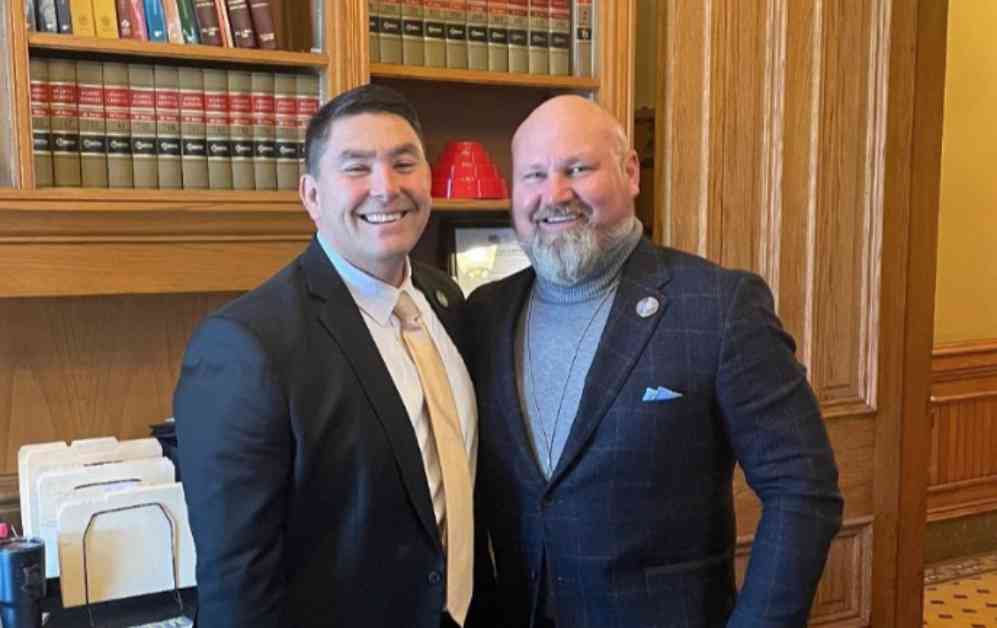Legislative Update: Rep. Henry Stone Advocates for School Safety, National Guard Scholarships, and Farm-to-Table Meat Sales
Republican Representative Henry Stone of Forest City, who represents Emmet, Kossuth, and Winnebago counties in Iowa House District 9, recently provided a comprehensive legislative update addressing crucial issues affecting the community. From enhancing school safety to supporting National Guard members through scholarships and promoting farm-to-table meat sales, Rep. Stone has been actively engaged in advocating for diverse initiatives that impact the lives of constituents in his district.
School Safety Enhancement
One of the key legislative efforts Rep. Stone has been involved in is House Study Bill 47 (HSB 47), aimed at enhancing school safety in Iowa. This bill mandates schools to establish multidisciplinary threat assessment teams to address and intervene when students exhibit threatening behaviors. By fostering collaboration between schools, law enforcement, and mental health professionals, HSB 47 seeks to create a safer environment for students and staff by proactively identifying and managing potential risks.
Moreover, HSB 47 facilitates the sharing of information between schools and government agencies regarding students grappling with mental health challenges. Additionally, the bill provides immunity from civil liability for individuals who report credible threats, thereby encouraging a culture of vigilance and proactive risk management within educational institutions.
National Guard Scholarships
In the realm of higher education, Rep. Stone has championed two bills, House File 117 and House File 118, designed to honor and support National Guard members in their pursuit of educational opportunities. House File 117 establishes the National Guard Service Professional Qualification Scholarship Program, covering the costs of educational programs approved by the adjutant general and offered by community colleges, regent universities, or private institutions. This initiative aims to support National Guard members seeking certifications in fields such as cyber security, IT, and emergency medical services, aligning with their service requirements.
Furthermore, House File 118 aims to enhance the National Guard Service Scholarship Program by recalculating scholarship amounts based on actual tuition costs and financial aid received. This adjustment not only streamlines fund distribution but also potentially expands access to scholarships for more recipients, underscoring Rep. Stone’s commitment to supporting military personnel in their educational pursuits.
Cost of Higher Education
As concerns mount over the rising cost of college education, Rep. Stone has delved into the factors contributing to this financial burden on students and families. A notable trend identified is the increase in administrative support relative to instructional staff at public four-year institutions. Data from US News reveals a shift in spending from instructional activities to administrative and non-teaching roles, driven partly by initiatives related to diversity, equity, and inclusion (DEI), mental health services, extracurricular programs, and workforce readiness initiatives.
Experts, including Jay P. Greene from The Heritage Foundation, Andrew Gillen from the Texas Public Policy Foundation, and Gregory Price from the University of New Orleans, have voiced concerns about administrative bloat in higher education. They emphasize the need to prioritize teaching and research while containing costs for students and taxpayers, highlighting the importance of transparency in financial allocations within universities.
In Iowa, data from the Iowa Regents underscores the disproportionate ratio of non-instructional to instructional staff at major universities, shedding light on the need for greater efficiency and accountability in resource allocation. As taxpayers contribute significant funding to regent universities, understanding how these resources are utilized and exploring opportunities for optimization is paramount to ensuring a cost-effective and accessible higher education system.
Facilitating Farm-to-Table Meat Sales
On a different legislative front, Rep. Stone and the House Agriculture Committee recently advanced House File 32, a measure aimed at promoting farm-to-table meat sales in Iowa. This bill introduces a new licensing framework for food processing entities inspected by the Department of Inspection, Appeals, and Licensing (DIAL) to store and sell officially processed packaged meat or poultry raised on farms or private residences. By legalizing on-farm storage and offering these products for wholesale or retail purchase, the legislation seeks to support local producers and expand opportunities for direct consumer access to high-quality meat products.
Moreover, House File 32 streamlines the regulatory process by establishing clear fee structures for licensing and inspection of on-farm meat and poultry production operations based on gross sales. This initiative builds on previous legislation to facilitate the growth of on-farm meat production and sales under state inspection, fostering economic opportunities for farmers and promoting consumer access to locally sourced, sustainable food products.
In summary, Rep. Henry Stone’s legislative efforts span a diverse range of issues, from student safety and educational support to sustainable agriculture and consumer access to local products. Through his advocacy and engagement with critical community concerns, Rep. Stone exemplifies a commitment to serving the needs of his constituents and fostering positive change within Iowa’s legislative landscape.









